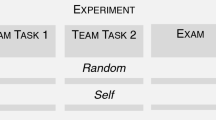Abstract
We run an experiment to test for peer effects between teams. The subjects perform a team-work task in pairs of payoff-independent teams. They receive feedback about the outcome of their own and the paired team. Consistent with peer effects, we find that this feedback induces substantial correlation of effort choices between teams. The correlation translates into the variation of outcomes within and across pairs of teams.
Similar content being viewed by others
References
Bandiera, O., Barankay, I., & Rasul, I. (2005). Social preferences and the response to incentives: evidence from personnel data. Quarterly Journal of Economics, 120, 917–962.
Bardsley, N., & Sausgruber, R. (2005). Conformism and reciprocity in public good provision. Journal of Economic Psychology, 26(5), 664–681.
Barron, J. M., & Gjerde, K. P. (1997). Peer pressure in an agency relationship. Journal of Labor Economics, 15, 234–254.
Che, Y.-K., & Yoo, S.-W. (2001). Optimal incentives for teams. American Economic Review, 91(3), 525–541.
Croson, R. T. A. (1998). Theories of altruism and reciprocity: Evidence from linear public goods games. Working Paper. The Wharton School, University of Pennsylvania.
Falk, A., & Ichino, A. (2006). Clean evidence on peer effects. Journal of Labor Economics, 24(1), 39–57.
Falk, A., Fischbacher, U., & Gächter, S. (2003). Living in two neighborhoods: Social interactions in the lab. IEW Working Paper No. 150. Institute of Empirical Research in Economics. University of Zurich.
Fischbacher, U. (2007). Z-Tree: Zurich toolbox for readymade economic experiments. Experimental Economics, 10(2), 171–178.
Fischbacher, U., Gächter, S., & Fehr, E. (2001). Are people conditionally cooperative? Evidence from a public goods experiment. Economics Letters, 71, 397–404.
Hamilton, B. H., Nickerson, J. A., & Owan, H. (2003). Team incentives and worker heterogeneity: an empirical analysis of the impact of teams on productivity and participation. Journal of Political Economy, 111(3), 465–497.
Houser, D., & Xiao, E. (2006). Punish in public. Working Paper, George Mason University.
Huck, S., & Rey-Biel, P. (2006). Endogenous leadership in teams. Journal of Institutional and Theoretical Economics, 162, 1–9.
Huck, S., Kübler, D., & Weibull, J. (2003). Social norms and incentives in firms. Working Paper, University College London.
Huck, S., Normann, H.-T., & Öchsler, J. (1999). Learning in Cournot oligopoly – an experiment. The Economic Journal, 109, C80–C95.
Kandel, E., & Lazear, E. P. (1992). Peer pressure and partnership. Journal of Political Economy, 100, 801–817.
Keser, C., & van Winden, F. (2000). Conditional cooperation and voluntary contributions to public goods. Scandinavian Journal of Economics, 102, 23–39.
Knez, M., & Simester, M. (2001). Firm-wide incentives and mutual monitoring at continental airlines. Journal of Labor Economics, 19, 743–772.
Lawler, E. E. (2001). Organizing for high performance. In Employee involvement, TQM, re-engineering, and knowledge management in the fortune 1000. San Francisco: Jossey-Bass.
Manski, C. F. (1993). Identification of endogenous social effects: the reflection problem. Review of Economic Studies, 60, 531–542.
Mas, A., & Moretti, E. (2008, forthcoming). Peers at work. American Economic Review.
Osterman, P. (1994). How common is workplace transformation and who adopts it? Industrial and Labor Relations Review, 47, 173–188.
Author information
Authors and Affiliations
Corresponding author
Electronic Supplementary Material
Rights and permissions
About this article
Cite this article
Sausgruber, R. A note on peer effects between teams. Exp Econ 12, 193–201 (2009). https://doi.org/10.1007/s10683-008-9209-1
Received:
Revised:
Accepted:
Published:
Issue Date:
DOI: https://doi.org/10.1007/s10683-008-9209-1




